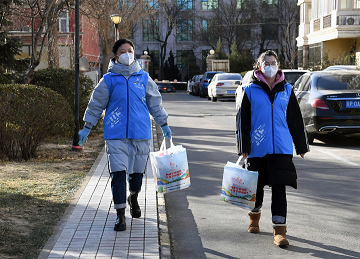BEIJING, Dec. 28 (Xinhua) — China has declared that starting on January 8, it will treat COVID-19 as a Class B infection rather than a more serious Class A infection. Tuesday’s press conference on the State Council’s joint prevention and control mechanism against COVID-19 provided more information on this policy change.
According to xhnewsapi.xinhuaxmt.com, Li Bin, deputy head of the National Health Commission (NHC), a number of reasons have produced the circumstances required for the most recent change in the way new coronavirus infections are managed. He cited the fact that China continuously monitored the virus’ mutation, moved quickly to promote vaccination and the distribution of medications, strengthened its system for medical treatment and epidemic prevention and control, and improved its emergency response capabilities.
“Currently, with the mutation of the virus, the change of the epidemic situation, the popularization of vaccination, and the accumulation of experience in prevention and control, China’s epidemic prevention and control have entered a new stage,” said Li.
Noting that the adjustment is fact-based and proactive and comes in light of new developments, Li said that “it in no way means letting go of the virus or a complete exit from prevention and control measures.”
On the contrary, “China will continue improving management, services, and guarantees,” said the official.
The adjustment will result in a shift in emphasis from infection prevention to medical treatment, according to Liang Wannian, head of the COVID-19 response expert panel under the NHC. She said that efforts should be taken to achieve a seamless, orderly transition.
According to Chang Jile, deputy head of the national administration for disease prevention and control, the downgrade of COVID-19 management will result in four major changes in China’s epidemic response efforts. Instead of using techniques like bulk nucleic acid testing, the nation will mostly identify infection instances while providing medical services and through individual patient monitoring.
Instead of being handled by treatment and observation in isolation, asymptomatic cases and moderate cases will be managed at home. The prevention and control of epidemics will concentrate on important sites, organizations, and population groupings. The official said that measures aimed at inbound tourists, such as closed-loop transportation and centralized quarantine, will be abandoned.
The needs for medical care vary depending on each community’s stage of the pandemic. According to NHC official Jiao Yahui, China has implemented many policies to organize local governments’ efforts to increase access to medical facilities and services.
Authorities are increasing medical resources for the treatment of very ill people and better utilizing the roles of top-tier hospitals and primary-level medical care facilities in order to better cure these individuals. Jiao said that older patients who are very ill should be referred directly to third-class hospitals for care rather than having to go through the hassle of many referrals.
After the most recent modification, Chang emphasized that the focus of China’s epidemic prevention and control efforts will be on preserving health and averting serious instances. China will improve medical response at critical sectors and venues, such as nursing homes, and better manage the medical response at enclosed facilities and large-scale events. China will step up protection for key demographic groups, including expanding immunization among senior people.
More regular hand washing, adequate mask use, and proactive vaccination campaigns have all been advocated.
Photo Credit: xhnewsapi.xinhuaxmt.com
+231778397650/+231881378585 gbaduquansah@gmail.com




